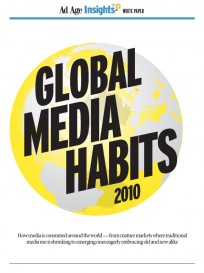















(From the Introduction. The complete report is available for $249 from AdAge.com.)
The first thing you should know is that the name of this report is the Global Media Habits survey. While we’ve been obsessed with the carnage in the American and, to a lesser extent, European media markets, for the last couple of years the global media landscape has mirrored the broader economic one–which is to say, developed nations are fragmenting while developing ones are booming across the board. This is as true for television and newspapers (newspapers!) as it is for online video and mobile phones, the latter of which is poised to become the most ubiquitous media device in history.

This bifurcation in media reflects another in the world at large. Not just marketers, but governments (e.g., in Britain, France, Greece, etc.) are slashing budgets and announcing austerity measures while ministers in New Delhi and Beijing (not to mention their corporate counterparts in Mumbai and Shanghai) are calling for massive increases in spending to reach a middle-class consumer who literally did not exist 20, 10 or even five years ago.
In a country like India, for example, two middle classes actually co-exist–a prosperous middle class by any measure (with an average income between that of the typical Brazilian and Italian) and an emerging middle class earning anywhere between $10 and $100 a day per person. The group making up that middle class accounted for one-third of the world’s population in 1990, but 57% by 2006, according to Indian economist Surjit Bhalla. That growth hasn’t been linear. If one graphs the average income of the world’s consumers, the middle earners comprise a large bell curve, while the top 1% and “bottom billion” form long tails on either side. That bell curve is moving en masse into the emerging middle class, creating a media boom in the unlikeliest of places….

» Folllow me on Twitter.
» Email me.
» See upcoming events.

Greg Lindsay is a generalist, urbanist, futurist, and speaker. He is a non-resident senior fellow of the Arizona State University Threatcasting Lab, a non-resident senior fellow of MIT’s Future Urban Collectives Lab, and a non-resident senior fellow of the Atlantic Council’s Scowcroft Strategy Initiative. He was the founding chief communications officer of Climate Alpha and remains a senior advisor. Previously, he was an urban tech fellow at Cornell Tech’s Jacobs Institute, where he explored the implications of AI and augmented reality at urban scale.

----- | January 22, 2024
The Future of Generative AI in Architecture, Engineering, and Construction
----- | January 1, 2024
----- | August 3, 2023
CityLab | June 12, 2023
Augmented Reality Is Coming for Cities
CityLab | April 25, 2023
The Line Is Blurring Between Remote Workers and Tourists
CityLab | December 7, 2021
The Dark Side of 15-Minute Grocery Delivery
Fast Company | June 2021
Why the Great Lakes need to be the center of our climate strategy
Fast Company | March 2020
How to design a smart city that’s built on empowerment–not corporate surveillance
URBAN-X | December 2019
CityLab | December 10, 2018
The State of Play: Connected Mobility in San Francisco, Boston, and Detroit
Harvard Business Review | September 24, 2018
Why Companies Are Creating Their Own Coworking Spaces
CityLab | July 2018
The State of Play: Connected Mobility + U.S. Cities
Medium | May 1, 2017
Fast Company | January 19, 2017
The Collaboration Software That’s Rejuvenating The Young Global Leaders Of Davos
The Guardian | January 13, 2017
What If Uber Kills Public Transport Instead of Cars
Backchannel | January 4, 2017
The Office of the Future Is… an Office
New Cities Foundation | October 2016
Now Arriving: A Connected Mobility Roadmap for Public Transport
Inc. | October 2016
Why Every Business Should Start in a Co-Working Space
Popular Mechanics | May 11, 2016
Can the World’s Worst Traffic Problem Be Solved?
The New Republic | January/February 2016

January 31, 2024
Unfrozen: Domo Arigatou, “Mike 2.0”
January 22, 2024
The Future of Generative AI in Architecture, Engineering, and Construction
January 18, 2024
The Promise and Perils of the Augmented City
January 13, 2024